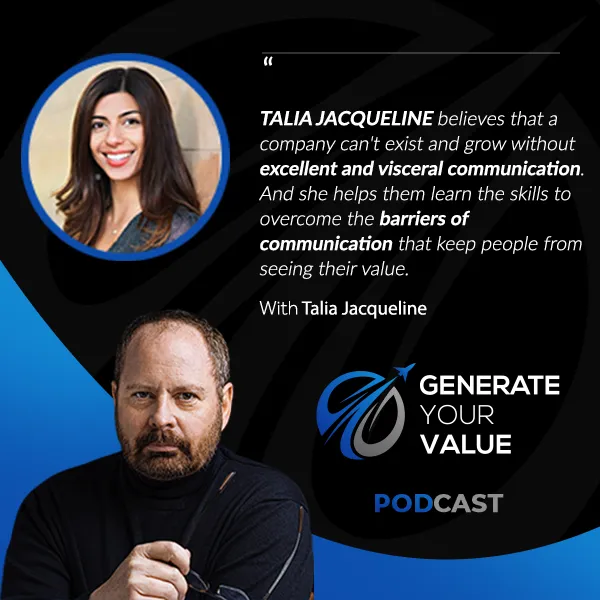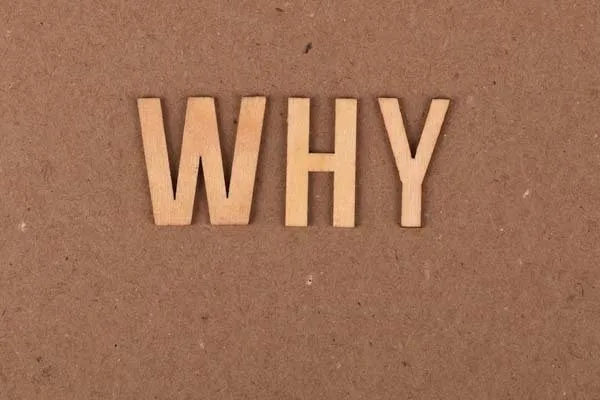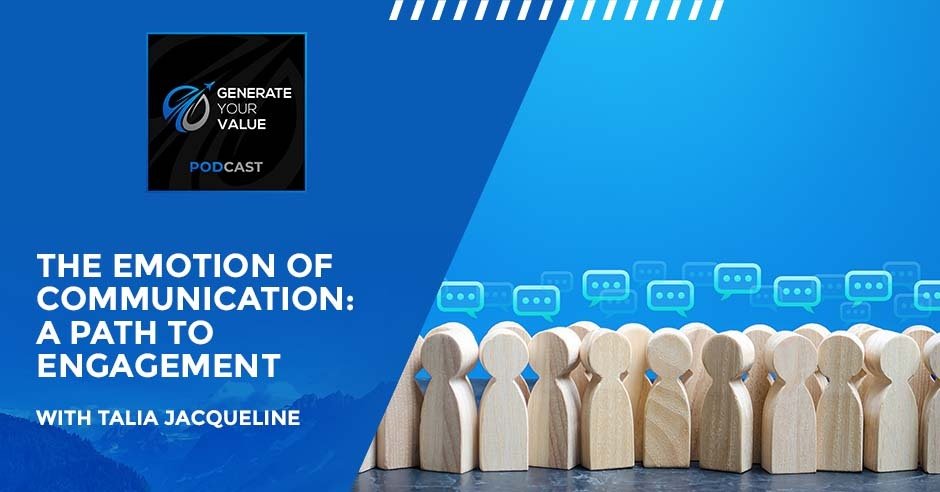7% of what’s absorbed in communication are words; 93% is emotion. As a leader, when you state your mission vision or ask somebody to do something, your employees can tell if you’re faking it based on your tone and body language. If you’re struggling to get any engagement going on, it’s probably because you don’t understand the psychology of communication. People act on emotions. You must feel, connect, and identify what you are saying.
Join Andy McDowell as he talks to the CEO of Visceral, Talia Jacqueline, about the role emotion plays in communication. Find out the science behind why people are more likely to listen to emotion. Learn why without psychology, communication is nothing. Discover how you can find employee engagement as a leader. Start communicating with emotions today.
LISTEN TO THE PODCAST HERE
The Emotion Of Communication: A Path To Engagement With Talia Jacqueline
UNDERSTANDING THE PSYCHOLOGY OF COMMUNICATION IS IMPORTANT
I’m bringing you a fantastic guest and subject of communication. That’s what we are doing now. We are going to talk about all things communication with my guest, Talia Jacqueline. Let’s start with the bio. She’s got a nice bio, and it states as follows. Communication is everything but according to Talia Jacqueline, psychology is everything because, without it, communication is nothing. During her third year of college, Talia founded her company, Visceral.
While majoring in Psychology and Business and taking a few detours off the beaten path, Talia started a trauma therapy practice at the age of twenty. What she realized as a coach and consultant are that it doesn’t matter how valuable you are if you can’t communicate it. That’s how Visceral was born, a training company in communications.
Talia works with C-Suite and sales teams of financial firms managing $2 billion to $5 billion in assets. Visceral’s training programs are available to any business in professional services. If your words are the barrier to people seeing your value, learning the skillset of communication is the answer. With that being said, Talia, welcome to the show.
Thank you so much, Andy. I’m honored to be here. I love that the word value keeps coming up. It’s something that we are going to talk a lot about through the lens of communication. It’s an honor to be here. Thank you so much for having me.
You are quite welcome. We love bringing people to the audience that truly bring value. We are going to have a, as we call it here on this show, golden nuggets for people relative to that. I tried to set up a bunch of questions to ask you that will enable that to happen. First of all, here at the show, we are all about stories. I love for the audience to hear your story of how you got into entrepreneurship. If you wouldn’t mind, give us the Reader’s Digest version of how you got to where you are now.

If I could sum it down to two things that inspired my path in entrepreneurship, I would say number one was my mother, who is my number one. The second was my own pain. First of all, my mom, a gem and a hero of a woman raised us four daughters as a single mom. She was running, probably, working three jobs at a time to take care of us.
There were mornings when she genuinely would come home at 8:00 AM to take us to school, and then she would use her lunch breaks to pick us up. She was hustling and working nonstop. During my sophomore year of high school, she came home one day and told us that she was quitting every single job and that she was going to start a business in graphic and web design, in which she had zero experience.
God bless my mom. She generally was self-taught. She would stay up until 4:00 AM watching YouTube videos on coding and design. She created her own business. It was tough for a few years, for sure, but her resiliency and her persistence were so inspiring to me. It affected me when I got to college. When I became an undergraduate student, I was majoring in Psychology and Business. I swear to God, I remember it was my second year of college, I was sitting down with my psych advisor and was presented with options of what path I could go down in psychology and therapy.
Honestly, none of it computed for me. The math didn’t add up for me on what the investment was going to be to get to grad school and then my Doctorate and what my base salary was going to be. For some reason, I was super rebellious against that traditional path. I believe that my mom inspired that. Flash forward, I became curious about trauma therapy.
For a lot of entrepreneurs, I don’t know if those reading relate to this but a lot of the time, the origin of entrepreneurship starts from a place of paint where you find some type of answer to something that you need, and then you want to go out and share that value with the world, so no one else has to experience that. For me, we had gone through a lot of trauma as a family.If I could sum it down to two things that inspired my path in entrepreneurship, I would say number one was my mother, who is my number one. The second was my own pain. First of all, my mom, a gem and a hero of a woman raised us four daughters as a single mom. She was running, probably, working three jobs at a time to take care of us.
There were mornings when she genuinely would come home at 8:00 AM to take us to school, and then she would use her lunch breaks to pick us up. She was hustling and working nonstop. During my sophomore year of high school, she came home one day and told us that she was quitting every single job and that she was going to start a business in graphic and web design, in which she had zero experience.
God bless my mom. She generally was self-taught. She would stay up until 4:00 AM watching YouTube videos on coding and design. She created her own business. It was tough for a few years, for sure, but her resiliency and her persistence were so inspiring to me. It affected me when I got to college. When I became an undergraduate student, I was majoring in Psychology and Business. I swear to God, I remember it was my second year of college, I was sitting down with my psych advisor and was presented with options of what path I could go down in psychology and therapy.
Honestly, none of it computed for me. The math didn’t add up for me on what the investment was going to be to get to grad school and then my Doctorate and what my base salary was going to be. For some reason, I was super rebellious against that traditional path. I believe that my mom inspired that. Flash forward, I became curious about trauma therapy.
For a lot of entrepreneurs, I don’t know if those reading relate to this but a lot of the time, the origin of entrepreneurship starts from a place of paint where you find some type of answer to something that you need, and then you want to go out and share that value with the world, so no one else has to experience that. For me, we had gone through a lot of trauma as a family.
For a lot of entrepreneurs, the origin of entrepreneurship starts from a place of pain.
I was super frustrated by the fact that at twenty years old that I would have to spend conventionally and conventional therapy 10, 15 or 20 years to heal. That notion didn’t click for me. I wanted to add value at a young age in my life. That motivated me to go outside of what was conventional and learn about trauma on a granular and deep level. That was my first business.
I had learned about it. It was profound. I was training with a company in Canada that I would use my spring and winter breaks in college to go out and learn with. It transformed me genuinely. These were techniques that, within days, sometimes even within hours, would dissolve a trauma to a place of neutrality where you could go and then use whatever that pain was as a catalyst for something.
You got it to a point where you could at least talk about it freely. Maybe not necessarily totally healed but it wasn’t down deep inside of you. You could at least talk to somebody about it in an open way.
It’s more neutral and maybe emotionless. That’s a profound place to get to if you’ve experienced any trauma. When I got to that place so young, I wanted to share that with people. I thought that trauma therapy was my life’s passion. I was going to go out and make a huge difference and help people heal super fast. Here’s what happened, as a twenty-year-old, networking in New York City at the time, I would go out and tell people what I did.
I would get that question that many of the audience on your show and people, in general, get of, “What do you do?” I would say, “I’m a trauma therapist.” They would go, “What Doctorate do you have?” I’m like, “I’m twenty years old. I don’t have a website and have no credibility to show for myself.” I would try different labels or titles and descriptions every single time.
I would say, “I was a coach.” Using the word coach was the biggest barrier because immediately, their eyes would glaze over, and it would fly over deaf ears when I would use that. I would get the response of like, “That’s cute. What do you know about life? How are you a coach of anything?” I had so much resistance. It was only until because of that feeling of I have so much value to give but people can’t see it. People can’t receive it if they can’t see it. That’s when I dove into communication and learned the psychology of it, how people process information, and how to present yourself. That became, and still is, probably will be my whole life, my life’s passion. That’s the story.
We’ve got many similarities from that perspective. A lot of people, if their head and heart is in the right place, they don’t want others to go through the pain and suffering that they did. Surely, that’s a huge part of the reason why I do what I do because of my self-esteem journey, high school, college, and early twenties. That’s from a trauma perspective. I love the story of your mother. My audience has heard me say a couple of times that I had a sign in my office at Boeing that read, “The best way to predict a future is to create it.” That’s what your mother did.
She created her future. She dropped everything, went on a journey of learning a new skill and talent, and created the life that she wanted for herself. It’s beautiful that she modeled that and passed that on to yourself to the point that you could sit there as a twenty-year-old listening to the typical pass and go, “Not for me.” It doesn’t fit my why, what I want to do, and the value that you wanted to deliver. I love that story. Part of the reason why I wanted to put you on the show was for you to tell that story. Let’s dive into communication. If you could define communication in one sentence, what would that sentence be?
I would define it as relating and speaking to someone’s deep inner feelings over their intellect and the words they use alone. That’s what communication is.
Communication is relating and speaking to someone’s deep inner feelings over their intellect and the words they use alone.
I would love to hear your thoughts on this. That sentence is strategic in nature. You could have well answered that question tactically to say it’s a means or method to distribute data and information to another party. It’s not a false statement but you are peeling the layers of the onion back pretty deep with the sentence that you picked. To me, that’s a robust, deep, strategic definition of communication versus tactical.
To add a comment to that, that’s what my company, Visceral, means. The word visceral is relating to someone’s deep feelings and intuitively doing that through the intellect. It is truly the definition of what communication is if you peel all the layers back. I love that you caught that.
I’ve got some more thoughts but I’m going to save them for the following questions. I will pop them in every once in a while. If we were to go even deeper, what are the various items in life and business and so forth that can be communicated? The reason I ask this question is that it begs the question, what forms this communication come in?
The truth is that there isn’t an item in life that is not communicating. In terms of the forms, there are your words, the tonality, and the emotion behind your words. There’s your body language, which a lot of people will hike up there, too. My argument, even on body language, is that it matters when you are sitting face to face, you are sitting down with someone, you are on stage, and people can physically see you but a lot of the time, and maybe more often, you are not visible. Even people reading are not seeing us. The breakdown of that communication is, some people know these statistics, 7% of what’s absorbed in communication are words. Ninety percent is an emotion. The breakdown of that is 55% is body language, and 35% is tone.

Body language is a visual means of communication. If you are not within visual range of somebody, no communication from body language can be exchanged. Most humans are not mind readers. Maybe there are a few around that I’m not aware of. We are not mind readers. I wonder what the world would look like if we didn’t have communication. If we were just bodies walking around the world and not communicating with each other, I don’t know as a species that we would survive. Is that a fancy way of saying that communication is essential in this world and for human beings?
It is. I would even go far enough to say that we wouldn’t exist in the first place, let alone survive without it. It’s important to consider that it has many different forms. When you look at other species that maybe don’t have a dialect in terms of anything that we can understand, a lot of it is emotional, energetic or there’s a different form of communication that they have. If we couldn’t speak to each other, it would be hard to exist as a species. I also wonder if we would be able to still communicate energetically through body language, emotion or tone. If you stripped communication out of it entirely, I don’t even know if we would exist in the first place. It’s that crucial.
I don’t think we would be able to work together as separate human beings as a community to be able to survive. We might stand a better chance of it in nowaday’s world, given the technology and other things that humankind has created. Way back when, when it was man versus Earth, I don’t think we would’ve survived without some form of communication, no matter how rudimentary it is. We talked in your bio about the psychology of communication. It’s not a question but I’m going to open the floor for you to tell the audience about your thoughts on the psychology of communication. When you say that phrase, what does that mean to you?
This is maybe my favorite thing to share with people. The way that I’m going to answer that is I want to share a little bit of the psychology but then give everyone reading a practical way to apply it and to understand it in your day-to-day, especially as a business owner. The breakdown of the communication, as we discussed, is 93% emotion and 7% are words.
The breakdown beyond that, which we missed earlier, is 38% is a tone if you break down what’s 93%. A lot of the time, people understand those metrics or breakdowns but it’s so much deeper than that. What I want to talk about is how is that emotion, the 93% processed by the mind, and then how are the words processed and how that affects an outcome in a conversation.
There isn’t a scenario where we are not communicating. In your business, you are always communicating between you and your leaders, you and your managers, you and your teammates, your teammates and clients, and clients and whoever. There’s never an instance where communication isn’t a huge fabric of a relationship. The way that the emotion is processed is as such.

There’s a specific neuron. It’s called a mirror neuron, which is a brain cell that reacts both when something is being performed and when it’s only being observed. I will give you the research behind this and the data behind how they even identified this. I will show you exactly how it relates to communication. This was a study that was done in the 1990s in Italy, where scientists had a monkey that was hooked up to an MRI brain scan.
It’s always a monkey and always in a lab. They had him hooked up to a brain scan, and he had an accessible bowl of nuts in front of him. Every time he would take and open the nut, the neurons in the brain would light up. One day, one of the scientists came into the laboratory, and there were nuts around casually. He opened up a nut.
The monkey was only observing him performing the action of opening the nut. The same neurons lit up in his mind, in his brain. Scientists were baffled. They did more research and discovered something called mirror neurons. This is the way that it works. If I’m observing you, your anger, joy, fear, sadness, the same neurons and emotions will light up in me simply by observing it.
What we’ve coined in our programs is something called the boomerang effect. This is how communication is working all the time. Behind every word is an underlying emotion and tone, which is the 93%. There’s an emotion underlying everything that you ever say. The emotion, whether it’s anger, passion, inspiration, sadness or fear, literally elicits that emotion in who’s listening to you. When you communicate as a leader from a place of anger, you will trigger anger as an emotional undertone in how they respond back.
When you communicate from a place of passion, it will elicit a sense of passion back. This dynamic is hidden in every interaction. One of the key components of this psychology is something called mirror neurons. There’s so much more psychology that we can continue to appeal back to. That’s the main concept behind that breakdown that people are familiar with but how does that function and operate in a conversation? It’s the boomerang.
In communication, that concept becomes important when you are trying to not only deliver possibly facts and figures or whatever in your communication but also how you want or influence the audience to feel about that. If you are trying to communicate something like a sense of urgency, concern or something of that nature, then the tone of your voice as you are communicating needs to be in that way so that trigger in their brain feels that. You get the facts and the logic piece communicated but you also get the emotional side communicated.
If we take ten steps back, it’s important to at least answer the question, “What is the purpose of communication?” I would answer that as to effect, to generate an outcome. Where this all comes together is, as a leader or as a person, the question you always want to ask yourself is, “What is the response that I’m hoping to generate out of this conversation? What’s the response, and what do I want to hear back? What’s the response to an action? What’s the response in an outcome?” Therefore, if that’s the response, how must I be communicating because of the boomerang effect? It starts with you.
The purpose of communication is to generate an outcome.
Let’s break that down a little bit. In my Boeing days, I had a formula I used when the team that I learned early in my leadership career. That was S plus R equals O. Situation plus your Response equals your Outcome. If we were to break down that formula with what you said behind the psychology communication, your S is wherever you are sitting in your situation, be life, business or whatever it may be, and then O is the outcome that you desire. You are going to solve for the R, we would say in math terms is, “I know my S, I have a desire in an O, now I have to solve or come up with my R to get that outcome. I have to decide how I want my communication to be in that R to get the O that I desire.”
More specifically, what the tone and emotion behind your community must be to get that outcome? I love that equation, and it’s true. Even using a more specific example in a business setting, if you were sitting down in front of a prospect and, say, a financial advisor, if you were coming from a place of scarcity. There was a sense of urgency or a need to close the business. That is what you are going to elicit in the prospect. The booming effect is the emotion of scarcity, and a sense of need on their part in the situation where they are sitting is what you are going to elicit. Now you are talking over each other. You are breaking rapport because of the emotion that you are leading with.
You set me up for the next question perfectly. I couldn’t agree with you more. A big part of my coaching and platform is about the impact of love and fear in people’s lives. To me, the most powerful tool that a person has in their life is choice. How do love and fear play into your decision-making when you are making choices, no matter how small or big, in your life? What I hear you saying and what you are bringing to the table is you are pig-piling a little bit here from the perspective of saying, “Yes to what everything you said, Andy.”
I’m going to add on top of it to the perspective that love and fear play big in your communication because of what you said, scarcity. Scarcity is fear from that perspective. If you start communicating and you are bringing emotions of fear to it, then your audience is going to hear that and start feeling that. You are not going to get the outcome that you’re looking for. I think that’s what you are saying.
It’s exactly true. I got goosebumps when you used the word choice because one of the greatest books that I’ve ever read is by Viktor Frankl, Man’s Search For Meaning. I don’t know if you’ve read that one. It’s brilliant. One of the things that he’s coined as a term, his experience, by the way, for those who have not read that book, is that he was a Holocaust survivor. He had an incredible form of therapy called logotherapy, which is all about helping people identify their meaning in life because when you are in difficult situations, you have a choice of how you are going to respond.
The way that I interpret that with regards to communication is the exact word that he uses called response-ability. As a leader, you have a responsibility to be response-able. The ability and the choice to respond in a situation in a conversation differently than maybe you were intending but in a way where you elicit the response that serves the highest outcome back from whoever you are talking to.
As a leader, you have a responsibility to be response-able.
The whole role of love and fear plays into that dynamic because, as a leader and as human beings, we are constantly oscillating between fear and love and the avoidance of something or the creation of something. The responsibility to have a choice, to make a choice, and pivot at the moment is important when it comes to communication.
Have you ever read a book by a gentleman named David Hawkins called Power vs. Force?
I have read that book. It’s great.
It’s a book that, I don’t know if I could say, totally changed my life but it made an impact from the standpoint of it gave me a structure to think of emotions and energy and solidified for me this whole love versus fear, peace with courage being the emotion.
There are some golden nuggets.
A lot of times, courage is used as a noun or verb. It’s an emotion. It’s the inflection point between all the emotions that are hooked to fear to all the emotions that are hooked to love, with love and fear being, I call them anchor points and all those emotions. If you are a leader that’s living in scarcity and fear, you may not be taking a step back and being introspective about how that dynamic is playing, how you lead, and how you communicate to your team, to customers, to colleagues, to everything else, and how that’s making an impact on the value that you are bringing as a leader. Let’s talk about business a little bit more.
I have always been a firm believer that depending on where you sit in an organization. I’m talking about large organizations. Obviously, it’s different if you are a business owner with two employees. When you get into the strategy and tactics of a business, the way you communicate, how you communicate, and what you communicate needs to change. In other words, there’s no one set answer or formula that there are different needs, wants, and desires from the organization, depending on where you sit within the organization, your communication method, style, whatever word you want to put on it, needs to change. Do you feel the same way?
I do. I look at it as sequential. Even in our programs, the first phase is all psychology. It’s understanding communication on a deep level and then understanding how it relates to you as a person yourself. The second is synergy. How do you then take that where you present yourself differently? How do you use emotion differently and interact with people having applied that knowledge? The third is strategy. My opinion or my perspective on strategy and the communication around that is that a lot of people sometimes jump too quickly into strategy and don’t understand what their data points are to know whether something is working or not.
When you are implementing a strategy, the communication is between the feedback that you are getting from the execution of that strategy and whether or not things are working. A lot of the time, without that understanding of the communication and the psychology element, it’s hard to decipher whether it’s the strategy or you as the person operating the strategy and the way that you are implementing it.
Communication evolves when you get into the tactics. You are not necessarily communicating with people as much as you are communicating with the feedback and data points that you are getting from whatever you are implementing. I do think that regardless of that psychology, understanding of psychology has to be there.
It’s a major player in how much engagement you are getting from your employees and your teammates. What I advise my clients on is that if you want engagement from your team and employees, then the most critical thing that you need to communicate is the why behind why we are doing these processes, activities or strategies. If you don’t connect to dots forms and talk about the why of why you are doing it to include why and how are you, the individual that I’m talking to, play into all of this from that perspective, you won’t get full engagement from people.
Even when you use the word strategy, there are two different strategies. There’s your internal strategy, exactly what you are describing of how you engage and interact with your people and how you show up in your communication there, and then there’s your external strategy, your marketing, your brand exposure, how you implement on an actual lead generation strategy or tactic. With regards to both, it comes back down to the question of, “What response am I getting from my team’s engagement? Is it positive? Is it negative? What’s the response? What’s the emotion? What’s the tone that I’m sensing? Can I check myself first to make sure that I’m not leading with that and therefore creating that response in my team?”
Going back to the why sometimes that’s why I’ve seen communicated in an abrasive, direct like, “Here’s our why,” and it’s not inspiring and motivating and something that people can buy into. Even with regards to using your why you must be mindful of what the emotion is that you are communicating and conveying behind the way you share that.
It goes back to the part of the conversation about what neurons are you firing in your tone and everything else that you are using. You could explain the why behind it and do a monotone thing that’s not going to elicit engagement in the response that you want out of it. It’s like, “I’m trying to explain this to you all. I’m excited about this because I’ve bought in. I knew about this before you did because it got communicated to me last week or two weeks ago or a month ago.”
I have been doodling on it. I asked the right questions. I’m bought in. I want to communicate that to you through the tone of my voice and everything else. I’m giving you the facts behind the strategy. I’m also communicating to you that I’ve bought in, I’m engaged, and I can see how this is going to move the company forward. I want you to hit your train card and my train card as a team. Let’s go after this.”
As you are talking about that, I get excited. I’m inspired even though you are just demoing an example. That’s important. You use this word strategy, and that was the origin of your question. Much of the time, without even doing it intentionally, the stuff around finding your why and communicating it, and being authentic in business is used as a strategy versus understanding that you can’t stand in front of your organization and share your why if you are not feeling it. It has to be something that you are connected to. It’s not just for the sake of having a why or being authentic. You can’t fake it.
Having a why isn’t a trend. It cannot be a trend. It can’t be something that you just use as a strategy because behind everything that you communicate. There’s a tone. The emotion behind it is what people hear. If you are standing in front of an organization as a leader and you are communicating a why because you heard you have to have one and you are not feeling it, your team is not going to feel it. A lot of the time, these things become trends and ways to be authentic but you are not being authentic because you are using it as a strategy versus it being an integral part of who you are. That stuff drives me nuts.

I want to hop in a helicopter with you, put you on the top of your mountain with your light, and let you shine that over and over again because I can’t tell you how many of those conversations I’ve had as a coach with leaders. I’m going to ask this question anyway, even though you’ve partially answered it anyway. On a scale of 1 to 10, how do you feel communication is important in leadership? I know the answer to this but I’m going to let you officially put it in the record.
It’s an 11 out of 10. I don’t think a company can exist and grow and be successful without excellent communication, and maybe visceral communication, because that’s what I believe is important.
I’m glad you put that plugin. With my growth as a leader over the years, I’ve come to learn about the importance of storytelling. We’ve even had a guest or two on the show that are experts in the area of storytelling because I believe in it so much in terms of being an effective leader and generating a lot of value in your team and for customers. Also, with everything, work on your skills when it comes to storytelling, particularly if you are going to be a leader. It’s a great life skill. When it comes to leadership, I would call it critical. There might be others that don’t feel it’s critical. How do you feel about the art of storytelling in life as well as in business? I would love to hear your viewpoints on that.
I feel the same way I feel about having a why. Storytelling is a huge skillset. A lot of the time, I see a lot of people use it as a tactic. I have to tell a story. If I could be a storyteller in this instance, in this meeting, the message will come across as stronger and more impactfully. I truly believe that the most amazing storytellers feel, connect, and identify with the story that they are sharing. Again, it goes back to having this visceral connection to the way that you tell stories for them to be even more impactful.
Only the most amazing storytellers feel, connect, and identify with the story that they are sharing.
The skillset of storytelling where you are creating a narrative, and there’s a character in that narrative, and people can, in a dissociative way, see themselves through the lens and eyes of someone else, is so powerful. We think in stories even. We are always creating narratives. People feel what you feel. I once had this professor in undergrad. It was a Public Speaking professor in course. He said, “What comes from the heart goes to the heart.” Storytelling, I believe, is such an amazing means of communication as long as it comes from the heart and you are connected to what you are sharing.
My favorite form or version of storytelling is analogies. I’ve worked on that skill quite a bit and have been complimented on it. Being able to come up with an analogy in a coaching environment to help place or have the person place themselves either in the story of analogy or it’s a situation that they have faced in life that deals with something else but it’s the same theme or the same idea behind the analogy that they can relate to. To me, it’s relatedness. They can find themselves in the story. Having faced the same experience or witnessed it, maybe they didn’t participate in it but they witnessed it. Therefore, it creates that connectiveness with you because of that shared experience.
I agree with that so much. I also believe from another psychological lens that storytelling is powerful because you are creating this objectivity where you are not telling the person directly or giving them something to look at objectively and then subjectively see themself through it. I agree with you so much on that. It’s super powerful, especially to have analogies and stories. It’s more powerful when you are connected to the message behind it.
If you are in the audience, you want to understand the impact of it. I invite you to go out to YouTube and watch some TED-type Talks from two of my favorite people in the world, Dr. Brené Brown and Simon Sinek, two of my heroes in the coaching world. Particularly Dr. Brené because she’s a master storyteller about her own life that hooks you, and you become connected and memorized with what she’s trying to say from that perspective. You will get some great examples of the power of storytelling by watching those two.
Those are two huge influences of mine as well.
Our time is coming to a close, unfortunately. I could talk to you all day about this subject. Maybe one day, we will physically get together. I will bring a bottle of wine. We can sit down and talk about life. I do that with Zach and his wife all the time. We have what we call bourbon and business meetings. Zach’s wife is from Kentucky. She’s my bourbon muse from that perspective. This whole show got started out of bourbon and business moment conversations. I’m going to throw a question at you that we throw at all of our guests. There’s no right or wrong answer to it. It’s about what comes from your heart. That question is, what do the words generate your value mean to you?
To me, the word generate has a connotation of action. It means to continually produce and to continue to reach new heights of value that you can share with other people. It means constantly going beyond what you’ve already generated and always being in pursuit of creating more value for others by even more deeply getting to know yourself and expanding what your capabilities and abilities are. It’s a word that connotes this action and this constant movement toward giving people value.

We go back to the conversation about scarcity. Life provides opportunities for you and opportunities to make choices. How prepared are you for those opportunities where you can make a choice of words, actions, and behaviors that are going to generate value in the lives of those who you are interacting with? That was my thought process when I decided to go out on my own and do this business after being laid off from Boeing and picking a business name of what brings joy, happiness, and success to people’s lives.
It’s about creating the life that you want for yourself. Go back to the S plus R equals O. If I want an outcome of a life journey that is constantly filled with joy, happiness, and success in my life, what kind of response is my life creativity and that response to get that kind of outcome? That’s what my whole coaching platform is about for your own individual life as well as your role as a business leader from that perspective.
My whole desire with this show is to bring on incredible guests like yourself to come on to the show and help bring to the building blocks those important pieces, and life hacks that people can learn about and use in that effort to generate the R in that equation for wherever they are sitting in life at the moment, their S, to get the outcome they want every single day that enables joy and happiness and success to show up in their life.
I greatly appreciate you taking time out of your life to share your wisdom with the world, to bring your value to the table, to share with others that they might take the golden nuggets out of this conversation and integrate it into their lives and get after it just like your mom did. Your mom went after it. It’s such an inspiring story. I’m so glad that you were willing to share that story, even though it was filled with some pain and suffering in it a single mom with four girls.
God bless her. She is my hero. There’s a lot to learn from that woman. Thank you so much for letting me share that.
Thank you for coming on. For the audience, thank you for your time in reading our conversation. I hope you got some golden nuggets out of it that you could use in your own life. If you think our conversation would be helpful for somebody that you know in your life, please don’t hesitate to share it. It’s available on all the major platforms, so they can be easily found from that perspective. Speaking of which, before we leave, Talia, tell the world how they can come to find you to engage with you, and let you generate value in their life.
You can visit our website. It’s www.VisceralCo.com. That’s the best place to reach us and understand a little bit more about Visceral Communication. I hope that you are walking away from reading with some tangible concepts, the boomerang effect, and ideas that help you be a better communicator in your life.
That’s a wrap. I hope you have a great day, no matter what’s going on in your life. Having an attitude of joy and happiness in your life is a choice. Have a great rest of the week. We will see you next episode with another great episode and guest who’s going to come in and hopefully generate value in your life. With that being said, take care.
IMPORTANT LINKS
ABOUT TALIA JACQUELINE
 They say, “Communication is Everything.” But according to Talia Jacqueline, the psychology is everything – without it, communication is nothing. During her third year of college, Talia founded her company, Visceral. While majoring in psychology and business, and taking a few detours off the beaten path, Talia started a trauma therapy practice at the age of 20. What she realized, as a coach and consultant, is that it doesn’t matter how valuable you are if you can’t communicate it. That’s how Visceral was born, a training company in communications. Today, Talia Jacqueline works with C-suite and sales teams of financial firms managing 2-5 billion in assets, but Visceral’s training programs are available to any business in professional services. If your words are the barrier to people seeing your value, learning the skill set of communication is the answer.
They say, “Communication is Everything.” But according to Talia Jacqueline, the psychology is everything – without it, communication is nothing. During her third year of college, Talia founded her company, Visceral. While majoring in psychology and business, and taking a few detours off the beaten path, Talia started a trauma therapy practice at the age of 20. What she realized, as a coach and consultant, is that it doesn’t matter how valuable you are if you can’t communicate it. That’s how Visceral was born, a training company in communications. Today, Talia Jacqueline works with C-suite and sales teams of financial firms managing 2-5 billion in assets, but Visceral’s training programs are available to any business in professional services. If your words are the barrier to people seeing your value, learning the skill set of communication is the answer.







